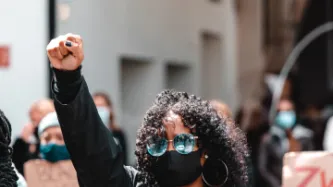Search
Content type: Advocacy
We submitted a report to the Commission of Jurists on the Brazilian Artificial Intelligence Bill focussed on highlighting the potential harms associated with the use of AI within schools and the additional safeguards and precautions that should be taken when implementing AI in educational technology.The use of AI in education technology and schools has the potential to interfere with the child’s right to education and the right to privacy which are upheld by international human rights standards…
Content type: Long Read
Introduction
India’s educational system is the largest in the world, with over 250 million students, 50% of whom attend publicly administered schools.
The autonomy given by the Indian Constitution to the 28 states and 8 union territories means that the right to education is implemented quite differently in each one, respecting culture, language, and other local specificities. Educational policies are suggested at the national level by various autonomous agencies and states can implement them in…
Content type: Examples
The energy company Cuadrilla used Facebook to surveil anti-fracking protesters in Blackpool and forwarded the gathered intelligence to Lancashire Police, which arrested more than 450 protesters at Cuadrilla's Preston New Road site over a period of three years in a policing operation that cost more than £12 million. Legal experts have called the relationship between fracking companies and the police "increasingly unhealthy" and called on the ICO and the Independent Office for Police Conduct to…
Content type: Examples
Emails obtained by EFF show that the Los Angeles Police Department contacted Amazon Ring owners specifically asking for footage of protests against racist police violence that took place across the US in the summer of 2020. LAPD signed a formal partnership with Ring and its associated "Neighbors" app in May 2019. Requests for Ring footage typically include the name of the detective, a description of the incident under investigation, and a time period. If enough people in a neighbourhood…
Content type: Advocacy
The proposal seeks to impose mandatory environmental and human rights due diligence on companies of a certain size that operate in certain sectors.
Our submissions address the very limited personal and material scope of the current draft of the Directive, which is unlikely to subject the most problematic technology and surveillance companies to the new due diligence obligations.
Content type: Report
This briefing takes a look at the private intelligence industry, a collection of private detectives, corporate intel firms, and PR agencies working for clients around the world that have made London their hub.
Often staffed by ex-spooks, and promising complete secrecy, little is known about them. But reports over the years have exposed their operations, including things like hacking and targeting of anti-corruption officials, spying on peaceful environment activists, and running fake '…
Content type: News & Analysis
In the midst of the atrocious war currently being waged by Russia on Ukraine, on 14 March 2022 Reuters reported that Clearview AI, the infamous online surveillance company, had offered its services to the Ukrainian defense ministry. A day later in an interview for TechCrunch, Ukraine's vice prime minister and minister for Digital Transformation confirmed that the partnership with Clearview AI was "currently in very early development".
Clearview is an online surveillance company that collects…
Content type: Advocacy
Privacy International has written to the Southern Co-operative supermarket chain to express serious concerns and ask for assurances following a report that it "completed a successful trial using Facewatch [facial recognition] in a select number of stores".
Facewatch describes itself as a “cloud-based facial recognition security system [which] safeguards businesses against crime.” Premises using the system are alerted when Subjects of Interest (SOI) enter their premises through the…
Content type: Report
One name in tech has become embroiled in controversy: Palantir, a big-data analytics outfit.Palantir weren’t that well known in the UK until the Covid-19 pandemic, when they were thrust into the national spotlight after the UK Government granted them access to reportedly unprecedented quantities of NHS patient data for processing and analysis in response to the novel Coronavirus.Palantir isn’t just working with the NHS, yet despite their extensive work with the government could potentially be…
Content type: Long Read
As more and more of us feel compelled to cover our faces with masks, companies that work on facial recognition are confronted with a new challenge: how to make their products relevant in an era where masks have gone from being seen as the attribute of those trying to hide to the accessory of good Samaritans trying to protect others.
Facewatch is one of those companies. In May 2020, they announced they had developed a new form of facial recognition technology that allows for the…
Content type: Case Study
The Peruvian government has a history of collaboration with the private sector in developing technology with the alleged purpose of providing greater security to citizens. The most recent example, the smartphone application "Peru En Tus Manos" launched in the context of the Covid-19 crisis, has been developed in a similar fashion and currently collects geolocation data on more than a million users. Although Peru has a proper legal framework for public private partnerships, developments are…
Content type: Case Study
Como is one of the most advanced cities in Italy in the use of facial recognition technology (FRT). An investigation for the Italian Wired magazine published in June 2020 exposed how the system had been bought, installed and tested for months with little transparency and despite the lack of a clear legal framework.
The investigation was entirely based on tools available to everyone, such as Freedom of Information requests (FOI requests. Similar to PI’s campaign 'Unmasking policing, inc', it…
Content type: Explainer
At first glance, infrared temperature checks would appear to provide much-needed reassurance for people concerned about their own health, as well as that of loved ones and colleagues, as the lockdown is lifted. More people are beginning to travel, and are re-entering offices, airports, and other contained public and private spaces. Thermal imaging cameras are presented as an effective way to detect if someone has one of the symptoms of the coronavirus - a temperature.
However, there is little…
Content type: Examples
The UK Government outsourced some of the testing centre work to Deloitte. The contract states that Deloit does not have to share data of positive cases with the UK health authority Public Health England nor to local government authorities. This prevented data sharing that was arguably essential to public health surveillance.
https://twitter.com/johnharris1969/status/1278259630628618241
https://www.theguardian.com/world/2020/jul/01/why-is-there-a-delay-in-sharing-covid-19-test-data-…
Content type: Long Read
Over the last two decades we have seen an array of digital technologies being deployed in the context of border controls and immigration enforcement, with surveillance practices and data-driven immigration policies routinely leading to discriminatory treatment of people and undermining peoples’ dignity.And yet this is happening with little public scrutiny, often in a regulatory or legal void and without understanding and consideration to the impact on migrant communities at the border and…
Content type: Long Read
What Do We Know?
Palantir & the NHS
What You Don’t Know About Palantir in the UK
Steps We’re Taking
The Way Forward
This article was written by No Tech For Tyrants - an organisation that works on severing links between higher education, violent tech & hostile immigration environments.
Content type: Case Study
Facial recognition technology (FRT) is fairly present in our daily lives, as an authentication method to unlock phones for example. Despite having useful applications, FRT can also be just another technology used by those in power to undermine our democracies and carry out mass surveillance. The biometric data collected by FRT can be as uniquely identifying as a fingerprint or DNA. The use of this technology by third parties, specially without your consent, violates your right to privacy.
The…
Content type: Long Read
In April 2018, Amazon acquired “Ring”, a smart security device company best known for its video doorbell, which allows Ring users to see, talk to, and record people who come to their doorsteps.
What started out as a company pitch on Shark Tank in 2013, led to the $839 million deal, which has been crucial for Amazon to expand on their concept of the XXI century smart home. It’s not just about convenience anymore, interconnected sensors and algorithms promise protection and provide a feeling of…
Content type: Explainer
The internet is filled with guides on how to file a Freedom of Information (FOI) request. Depending on the country you are in, it is likely that a local NGO – or your national freedom of information authority. – will have come up with one. The Global Investigative Journalism Network has an excellent list of FOI resources available in many countries across every continent. We really recommend you take a look at it; many of the FOI guides we love are in that repository.At PI we equally spend much…
Content type: Case Study
Well into the 21st century, Serbia still does not have a strong privacy culture, which has been left in the shadows of past regimes and widespread surveillance. Even today, direct police and security agencies’ access to communications metadata stored by mobile and internet operators makes mass surveillance possible.
However, a new threat to human rights and freedoms in Serbia has emerged. In early 2019, the Minister of Interior and the Police Director announced that Belgrade will receive “a…
Content type: Explainer
Hello friend,
You may have found your way here because you are thinking about, or have just submitted, a Data Subject Access Request, maybe to your Facebook advertisers like we did. Or maybe you are curious to see if Policing, Inc. has your personal data.
The right to access your personal data (or access right) is just one of a number of data rights that may be found in data protection law, including the European Union's General Data Protection Regulation, better known as "GDPR", which took…
Content type: News & Analysis
On June 9th, in light of the global debate against racial injustices, the company IBM announced they would stop selling facial recognition. In a letter to the US congress, they demanded a “national dialogue on whether and how facial recognition technology should be employed by domestic law enforcement agencies.”
It is worth noting first of all that it is not entirely clear that IBM is actually stopping facial recognition. The letter states that "IBM no longer offers general purpose IBM facial…
Content type: News & Analysis
Yesterday, Amazon announced that they will be putting a one-year suspension on sales of its facial recognition software Rekognition to law enforcement. While Amazon’s move should be welcomed as a step towards sanctioning company opportunism at the expense of our fundamental freedoms, there is still a lot to be done.
The announcement speaks of just a one-year ban. What is Amazon exactly expecting to change within that one year? Is one year enough to make the technology to not discriminate…
Content type: Long Read
On 12 April 2020, citing confidential documents, the Guardian reported Palantir would be involved in a Covid-19 data project which "includes large volumes of data pertaining to individuals, including protected health information, Covid-19 test results, the contents of people’s calls to the NHS health advice line 111 and clinical information about those in intensive care".
It cited a Whitehall source "alarmed at the “unprecedented” amounts of confidential health information being swept up in the…
Content type: Press release
Photo by Ashkan Forouzani on Unsplash
Today Privacy International, Big Brother Watch, medConfidential, Foxglove, and Open Rights Group have sent Palantir 10 questions about their work with the UK’s National Health Service (NHS) during the Covid-19 public health crisis and have requested for the contract to be disclosed.
On its website Palantir says that the company has a “culture of open and critical discussion around the implications of [their] technology” but the company have so far…
Content type: Long Read
The UK’s Metropolitan Police have began formally deploying Live Facial Recognition technology across London, claiming that it will only be used to identify serious criminals on “bespoke ‘watch lists’” and on “small, targeted” areas.
Yet, at the same time, the UK’s largest police force is also listed as a collaborator in a UK government-funded research programme explicitly intended to "develop unconstrained face recognition technology", aimed “at making face…























